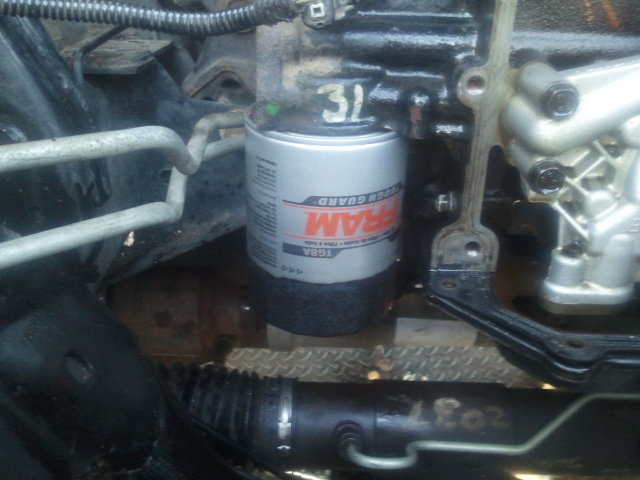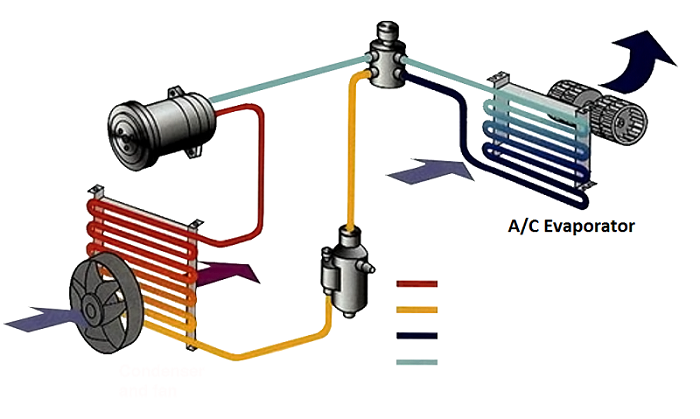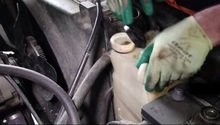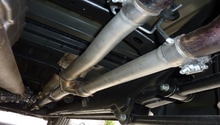Dodge Ram 2009-Present: Engine Smell Diagnostic Guide
For the most part, your Silverado offers a reliable, smell-free drive. However, if you begin to notice something being off in the olfactory department, it should be investigated. If left to its own devices, you could face expensive repair bills in the future. Don't get caught out, diagnose the issue.
This article applies to the Dodge Ram (2009-present).
You've had your wheels balanced and your alignment checked, but your truck still vibrates as you drive down the road. The problem could be under your hood. Just as a runner needs oxygen to perform properly, so does your engine. There are a number of things that can happen to the delivery of fuel, ignition, and the mixture of gasses/air in the combustion chamber that can cause your engine to shake your truck. Here are a few simple things you can do to stop the problem.

Materials Needed
- Flashlight
- Rags/towels
Burning Smell (Oil)
How's your oil looking?
A hot, burning smell is usually indicative of an oil issue. There are two things to check.
First, check the oil level by pulling the engine oil dipstick, wiping the dipstick clean, and inserting it back into the engine. Then pull it out and inspect the level. The dipstick has a notch indicating if the oil level is low, and more notches higher up indicating a high, or full, level. You want this reading to be exactly in the middle. Over or underfilling the engine oil can lead to engine damage.
If your oil level is low, here are some things to consider:
- Hemi engines tend to use a little bit of oil with age, burning one quart over the course of a 5,000-mile oil change interval is considered normal.
- The "MDS" Cylinder deactivation system has been linked with oil consumption. Extended periods of time in "V4 mode" can burn additional oil versus standard operation.
- Oil filter leaks seem to be common with the 5.7L Hemi. Forum users indicate that the oil filter gasket that mates the filter to the housing requires oil lubrication, and often does not receive it when serviced at the dealership. The gasket heats up and causes oil to seep out.

If your oil level is okay, here is a common thing to consider:
- Have you recently had your truck serviced? The oil filter for the 5.7 Hemi is in a tricky spot, and when you change the oil, it's not uncommon to have the old oil spill out of the filter and stain the bottom of the engine. Reference Figure 1, as seen above. This causes no harm or damage, and will burn off naturally with use.
If it's not an oil issue, maybe it's a coolant calamity.
Sweet Smell (Coolant)
Your truck could be burning or leaking coolant.
The odds of this occurring to a newer vehicle like your Ram are slim, but it's worth identifying. Coolant, or antifreeze, has a sweet scent when hot. If you have a leak or are burning coolant, it would cause a sweet smell to waft through the vents and into the cabin.
- Check your coolant level while the engine is cold.
- Look around the engine bay for leaks; perhaps a cut of snagged hose could be leaking.
If no leaks are found and the smell persists, then you may have a larger issue. Some very early 2009 models had quality control issues regarding a possibility for premature head gasket failure. Keep in mind, this was a very slim number of vehicles. Continually keep an eye on the coolant level and engine oil level, until it is time to change your engine oil. The engine's coolant should be mixed with water. Oil and water don't mix and should be kept away from one another. When you drain the oil, you should clearly be able to see if coolant has contaminated your oil. If this is the case, you would be best advised to contact your local Dodge dealer for a resolution, as replacing head gaskets is not for the fainthearted.

If the engine seems healthy (count your blessings!), but the smell persists, it's time to move on to the next section.
Rotten Egg Smell (Catalytic Converters)
Your catalytic converters may have failed.
Catalytic converters are usually good in excess of 150,000 miles and 10-15 years; however, sometimes they fail prematurely. A catalytic converter (cat) gone bad will either clog or blow out the ceramic material (catalyst) inside the unit. This produces a sulfuric smell, similar to rotten eggs. If you suspect bad catalytic converters, usually repair is not an option, and they must be replaced.
Before we get ahead of ourselves, if you feel that you may have an issue with your catalytic converters, there are a few things to check:
- If it is the primary catalytic converter, it will trigger error codes (check engine lights). If your car has the CEL illuminated, have the codes read and proceed accordingly.
- Secondary cats will not throw error codes. To test them, when the truck is cold, get underneath and shake the cat or tap it with a hammer or mallet. Loose catalyst inside the cat will sound tinny and rattly; a functional cat will sound like a dull thunk or clunk when treated the same.
- A clogged cat will not function properly and cause poor driveability. If you suspect a clogged cat, testing for it is simple: Turn the truck on and drive it to operating temperature. Park the truck and, while running, take a look underneath the truck at the exhaust. A clogged cat will show signs of overheating, and they can glow bright red if the hot exhaust gasses get trapped inside.

Musty Cabin Smell (Air Conditioning)
Are your vents set to recirculate?
Many people with Rams (and other Hemi-equipped Dodge/Chrylser/Jeep models) complain of a musty smell coming from the air conditioning vents upon start-up, or after sitting for a while. This occurs when the vehicle's HVAC system is set to "recirculate" mode.
The air conditioning system utilizes an evaporator unit, which catches and pulls excess moisture from the cold air being sent into the cabin. On humid days, that excess moisture can become trapped in the evaporator when the truck is shut off for the day. Fungi and mold can grow from that moisture in the evaporator, causing the musty smell when the truck is started the next day and the A/C is on.
The unofficial fix for this is to change the vent setting from recirculate before shutting the truck off. This allows that excess moisture to slowly be let free from the system.

Related Discussions
- Burnt Oil Smell 2010 Dodge Ram - Dodgeforum.com
- Question About MDS Ram Hemi - Dodgeforum.com
- Occasional Coolant Smell in Cab - Dodgeforum.com
- Rotten Egg Smell - Dodgeforum.com
- My A/C Stinks - Dodgeforum.com






